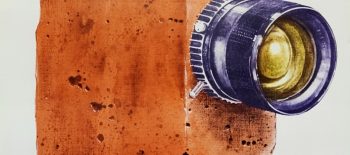Episode 18 and all video recordings are available at:
Polish Cultural Institute New York YouTube
Encounters with Polish Literature is a video series for anyone interested in literature and the culture of books and reading. Each month, host David A. Goldfarb will present a new topic in conversation with an expert on that author or book or movement in Polish literature. More about the Encounters with Polish Literature series and the timeline.
June 30, 2022 marks the centennial of the birth of Miron Białoszewski (1922-83), one of the most innovative poets in twentieth-century Polish literature. Like other poets of the postwar era, he was inspired by the formal experimentalism of the interwar avantgarde, but drawn toward the language of everyday life, rejecting prewar aestheticism, and adopting colloquial Warsaw diction in a way that was unique to his writing.
After the war, he worked as a journalist in various positions, but was unwilling to conform to the tenets of socialist realism, and he was an openly gay man in a closeted era. He faced police interrogations and slurs painted on the door of his apartment, and had great difficulty finding work, living at times in extreme poverty, writing poetry with no immediate prospects for publication until the Thaw of 1956, when his works were first published. In 1970 he published A Memoir of the Warsaw Uprising, recounting in fragmented, anti-heroic language, the civilian experience under German bombardment, challenging the Romantic narrative of the Uprising as it was generally conceived.
In this episode we look at one of his most popular earlier poems from his collection The Revolution of Things, “’Oh! Oh! Should they Take Away My Stove…’ My Inexhaustible Ode to Joy.” We examine some of the narrative innovations in A Memoir of the Warsaw Uprising. And we consider the queer themes and double-voice in a few passages from his later short prose works.
Selected works by Miron Białoszewski in English translation:
Items that do not have a link may be found in libraries, through interlibrary loan, and in the case of journals often through electronic databases available through research libraries like Project Muse, ProQuest, EBSCOHost. Occasionally these journal issues or long out of print books also appear on the used market through sources like AbeBooks and eBay.
“Aniela in the Town of Folino…” Tr. Stanisław Barańczak and Clare Cavanagh. in Translation, v. XXI (Spring 1989), 38-39.
“Even if They Take Away My Stove: My Never-Ending Ode to Joy,” “Girl from the Sticks,” “The Ballad of Descending to the Shop,” and “From ‘Directions to Suspension.’” Tr. Andrey Kudryavitsky. Literary Review. 1 Mar. 2012. 126-29.
A Memoir of the Warsaw Uprising. Tr., intro., and notes by Madeline G. Levine. New York: New York Review Books, 2015.
“My Jacobs of Exhaustion” and “Secret Freedom.” Tr. Jan Darowski in Gömöri, George and Newman, Charles. New Writing of East Europe. Chicago: Quadrangle Books, 1968. 239-40. (Available in libraries and through interlibrary loan)
The Revolution of Things. Intro. and tr. by Andrzej Busza and Bogdan Czajkowski. Washington: The Charioteer Press, 1974.
“Self-Portrait in Touch,” “I Imagined,” and “Nights of Inseparability.” Tr. Iwona Gleb and Ela Perepeczko in Holton, Milne and Vangelisti, Paul, eds. The New Polish Poetry: A Bilingual Collection. Pittsburgh: University of Pittsburgh Press, 1978. 34-39.
“Typed with One Finger” and “We Starfish.” Tr. Jakob Ziguras. New England Review. V. 40 (2019). 54-55.
Barańczak, Stanisław and Cavanagh, Clare, eds. Spoiling Cannibals’ Fun: Polish Poetry of the Last Two Decades of Communist Rule (galleys only). Foreword by Helen Vendler. Evanston, Ill.: Northwestern University Press, 1991. *Białoszewski is not included in the final published edition of this book, because the publisher was unable to obtain the rights, but uncorrected proofs containing drafts of those translations might be found on the used market.
Tardi, Mark, ed. [21 poems by various translators]. Aufgabe 9 (2010).
Selected critical works:
Niżyńska, Joanna. The Kingdom of Insignificance: Miron Białoszewski and the Quotidian, the Queer, and the Traumatic. Evanston, Ill.: Northwestern University Press, 2013.
Płaczkiewicz, Artur. Miron Białoszewski: Radical Quest Beyond Dualisms. Frankfurt am Main: Peter Lang, 2012.

Joanna Niżyńska (Indiana University) is an Associate Professor of Polish Literature and Culture in the Department of Slavic and East European Languages and Cultures at Indiana University where she also served as Director of the Polish Studies Center from 2015 to 2020. She approaches her field from a comparative perspective and pursues research that crosses disciplinary and national borders. Her longstanding interests in intersections between trauma, memory, and the everyday are reflected in her monograph, The Kingdom of Insignificance: Miron Białoszewski, and the Quotidian, the Traumatic, and the Queer (Northwestern UP, 2013; Polish translation Królestwo małoznaczącości: Miron Białoszewski a trauma, codzienność i queer, Universitas 2018), and is a co-editor of Germany, Poland and Postmemorial Relations: In Search of a Livable Past (Palgrave Macmillan, 2012). She is a coeditor of Being Poland: A New History of Polish Literature and Culture since 1918 (Toronto UP, 2018), an 800-page interdisciplinary volume with sixty contributions from a team of international scholars written with an English-speaking audience in mind. She has received a Fulbright Fellowship to spend 2022-23 in Warsaw, researching her new book project on contemporary Poland’s cultural memory from the perspective of long lasting imprints of communist politics of memory, particularly as pertaining to Polish-Jewish past.
Bartek Remisko, Executive Producer
David A. Goldfarb, Host & Producer
Natalia Iyudin, Producer




